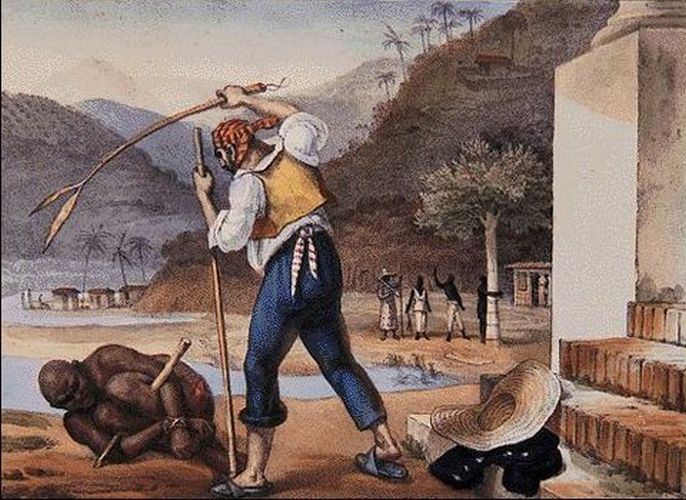
First impressions of Recife are grim and I suspect that they're not going to be altered as easily as Brasília. - Met my first Brasília detractor, Edson Nery de Fonseca. He lived there for twenty years, was Librarian of House of Representatives and calls Brasília “a crime against humanity.”
What I've seen of Recife seems to earn that appellation. Whereas we in “developed America” flinch at abandoned dogs and cats, here you have to get used to droves of abandoned children, abandoned people. I remember in Rhodesia (Zimbabwe) some years ago, remarking on the number of people, young especially, hanging around the streets of Bulawayo during work hours: Here was the real “security” risk.
Recife is a hundred times worse. Hundreds and hundreds of kids, adults, beggars with nothing to do; hundreds of others pathetically trying to make an honest living by selling anything from plastic toy planes to graters, packs of envelopes, sidewalk foodstuffs. Many gravitate to Recife from the backlands seeking a new life and, I suspect, invariably meet disappointment.
As Luiz “Black Jimy” said yesterday: “It is a life of humiliation.”
Alongside this cruel, brutal poverty is first real evidence of The Military. In Salvador, Brasília, in countless little villages, you see a few police/militia but here the presence is overwhelming. Traveling out to the Institute (Fundação Joaquim Nabuco) you pass base after base of one or another military establishment.
My immediate response is that this is a manifestation of government awareness of past rebelliousness on part of Recife/Pernambuco, traditionally a point of fire through every regime. Walk the streets and you easily understand the “nervousness”...
As anyone who knows me will accept, I am not one to creep into a protective shell. I love exploring a new city by day/night, really “exploring” it and its people. Here, for first time, I feel a need for caution. Step out there, let things carry you along, and I sense real trouble. There are thousands in real need and desperate: One lone “American tourist” is a quick mark. (Like the licensed bandit of a taxi driver who charged me 400 cruzeiros for what should've been a 80cr. ride. Made up for it though, with bus ride x 18cr. to Joaquim Nabuco Foundation.)
Difficult to believe that twenty-two days have elapsed since my arrival. Have covered thousands of miles, met dozens of people, many beyond the mere acquaintance phase. Toughest part of the trip is breaking fresh ground each time, going through the long introductory phase, establishing credentials. The whole day today was spent in this activity. But it's vitally important for research. Go slowly, let them understand you, above all believe in you, and win their confidence. - I overheard Nery at lunch telling Fernando Freyre, Gilberto's son, “He is a serious student of Brazil.”
Got my first glimpse at Museum of Man in the North-East, of sugar plantation artifacts: sadly impressive preponderance of equipment to keep slaves in their place. Worst was a device called "The World Turns” which would make a man into a ball-like figure binding leg and arms.

Edson Nery liked my description of Brasília as the ultimate "fazenda" and example of the coronel and latifundia way of life.
Guide at Museum, Amalia Correa, from one of old families with an engenho (plantation) to the south, expressed to this stranger all manner of statements about the poor summed up by: “It's the will of God.” The same is said by others in so many places...
Things like that make me realize just why there was all the ELU traveling in the past. To write a book for the world you have to know the world. You have to have a comparative base to work from, a benchmark against which you can “rub” your opinions and see how they come up.
Prosaic note: Lord, the food is monotonous: Steak ABCD/ Frango (chicken) ABC/Fish ABC/ That's it, day after day. For a week now I've had file (fillet)/contra file + beer + coffee!
July 30 - Not always possible to maintain an enthusiastic “high” - Once in a while, as now, it slips and you feel a real stranger.
Edson Nery, library “scientist” at the Fundação Joaquim Nabuco, lay Benedictine monk, could not be nicer but has no concept of what it takes to write a book like "Brazil." Yesterday was spent poring over museum collection - useful; today was passed in Foundation's library with excellent old engravings, also useful but dangerous. I have to get out, experience and “look.” U.S.A. has best libraries in the world and when I'm back home I can sit in them for as long as is necessary. Here, I have got to see not pages but people. And the past insofar as one can separate present sights and scenes from what has been.
Edson is a dear librarian of special repute, no doubt, but too close to his books and eleven cats to see the reality. A contemplative man, he himself says, grown pessimistic about the world and seeking his main solace in Sunday hours spent with the Abbot and Prior of the Monastery at Olinda.
So, though the day was spent in hard research and I got many visual images of use, I'm wary of over-involvement with the Fundação. Maybe they will come up with an engenho to visit and, of course, there's my interview with Gilberto Freyre himself. But I'm determined that these hours shall not be “book-bent.”
Working in a strange country is exhausting when you don't know the language. Everything takes double the effort. Hopefully, it brings double the reward in quality!
July 31 - Once again proved that to accomplish things in the tropics you have to step beyond the lethargy so easily induced.
Day started with call to Edson Nery at home complaining very indirectly about lack of cooperation. Well, aside from suggestion that I go back to the library to look at more pictures this morning as planned, Edson showed clear understanding of my needs. A car will be arranged!
And it is: In afternoon my Recife travels begin in earnest. I'm also invited to dinner tomorrow night with anthropologist Dr. Robert Motta and friends
Afternoon visit to Iguaraçu, site of first church in Brazil, built 1535/plus Jesuit church/and third church atop hill. All vital to story since it is vicinity between here and Recife proper that I will place Cardosos (“Cardoso” family later changed to “Cavalcantis.”) Have to find way to move to second locale. Will probably be after Dutch invasion with re-start further away.
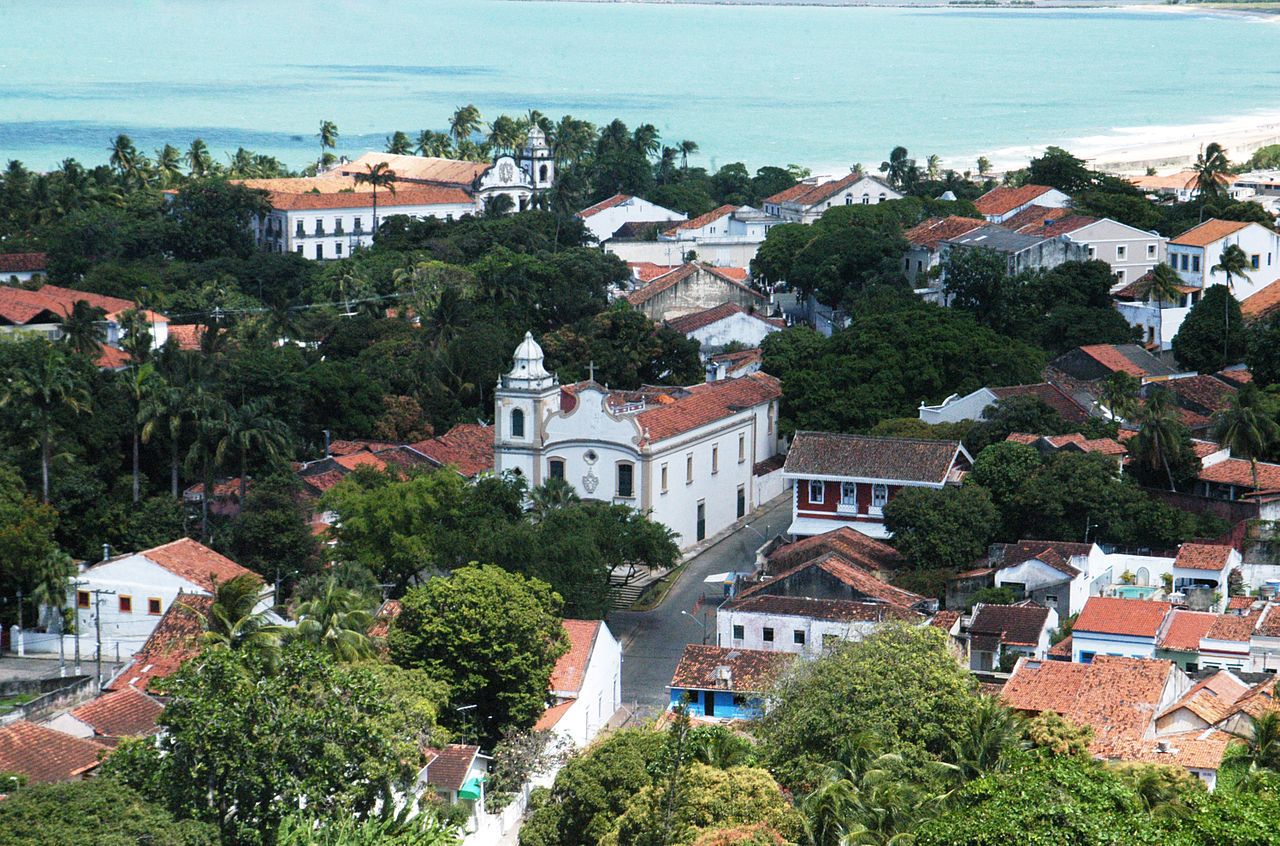
My guide, Amalia Correa, proves as fascinating as the historical aspect. Her brother was Minister of Agriculture under Goulart. Father was federal deputy from Pernambuco representing Bom Jardim to the north. Family is obviously one of the older political ones with classic coronel (Cardoso?)and wide connections.
Memorable anecdote of Amalia's sister who teaches in p.m. at a favela: "Simple things that people will understand like words for food etc. She explained 'meat.' Woman in class responded: 'Oh, I know meat but it is so long since I have tasted it.'"
August 2 - Today was spent at a Benedictine monastery, Monasteiro São Bento, in company of Edson Nery as guest of Dom Basilio Penido and Dom Felix Bruneau. For one who has often stayed a distance from the church, a day in the company of the monks was a deeply moving experience.
What does one on the outside know about monks, cloisters, liturgy, Gregorian chants? Painfully little, so that you are surprised to find that life is very normal. Started at 10.30 and attended various offices with the monks, 1st at 10 to 12, then vespers at 5.30, mass (1/2 plus communion), then completa at 8.00 p.m.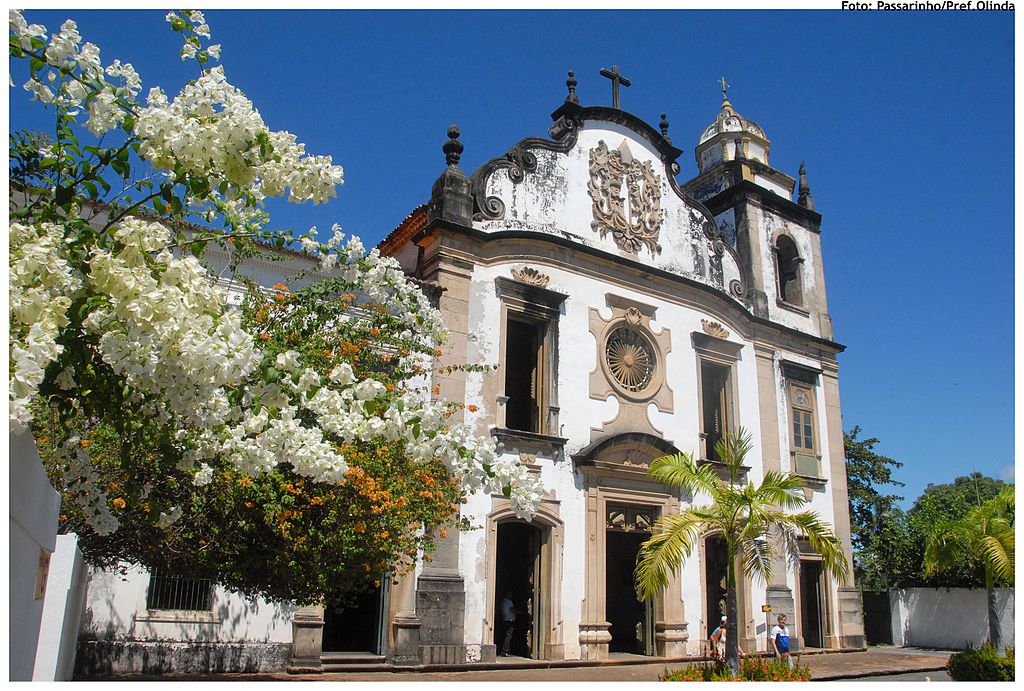
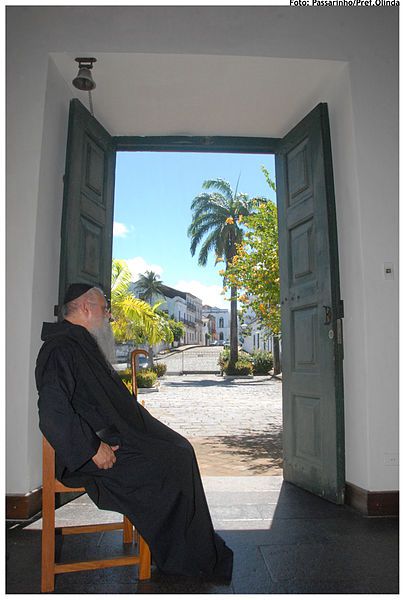
Today was a great contrast to Saturday's event. First drove with Amalia Correa around Recife and Olinda. I now understand the topography, Tamaraca, Iguaraçu, Pão Amarelo, Olinda, Recife, Guarapes are no longer mere names. I look forward to returning to my books and re-reading material with a deeper understanding.
Saturday night was yet another contrast with Roberto Motta, religious anthropologist and his gay theatre/art friends. They drink like fishes, hug each other fervently and between this, argue politics.
Silvio, a black man, proves most illuminating. With Roberto, he's off to a Brazil-Africa conference in Rio on Monday, the first of its kind. Silvio makes an interesting point about racism: The world laughed when Emperor Bokassa (Central African Republic) was crowned calling him “a stupid black etc.” The world rejoices with Charles and Diana..."
Ended evening at gay bar in Casa Forte with more political talk, little of which I could follow except to realize that the 25-35 generation of intellectuals in this country is seething, all attention directed toward the November 15, 1981 elections, the first democratic elections since 1964.
I'm beginning to see why military presence is so obvious in Pernambuco. There is an atmosphere of rebelliousness about the place.
At so many levels beyond the “haves” and the “playground” people, there is chronic poverty. A dramatic example of this is Recife Yacht Club: To get to it you drive for miles through “Brasília Teimoso,” a favela that started as a squatter camp at the same time as the new federal capital. The streets are pools of filthy water, no sewers, little lighting, a mix of permanent, cinder-block houses and shacks.
Keep encountering comments and evidence of racism and color differentiation. Silvio asked a top general why there were so few black generals in Brazil. Man replied that no more than fifty black people in senior posts in the country. I wonder how Gilberto Freyre reconciles his interpretation of a “New Man” in the tropics with the reality expressed by so many people I meet of racism in Brazil - of the innumerable “classifications” of color, once relatively harmless and superficial but assuming a more serious nature as jobs get scarcer, poverty worsens and color deepens. This all strikes this ex-South African observer sharply. Brings to mind, too, the confusingly contradictory attitude of the South African Progressives.
August 3-4 - Interview an opposition politician/spend more time poring over photographs of senhor de engenhos/evening with Ivan Cordero and group of young Brazilians/morning of 4th at State Museum/afternoon arranging visit to engenho (plantation)and interview with foremost Recife historian/ tonight to view cultural slides at gallery at 9!
And I wonder why I am occasionally tired? Not so much the physical effort, though extreme humidity can be taxing, as mental absorption of so much detail, especially constant switching from one subject to the next and need to store information under so many categories.
Today is exactly four weeks since I arrived in Brazil, the acclimatization/acculturation is over; what strangeness remains is of a local variety — the change of pace from one city, town or village to the next, the change of contacts with people. Broadly, I am beginning to look at this world around me with a sense of familiarity. Perhaps what brings it that much closer is that people, too, are beginning to repeat ideas and opinions, especially contemporary ones.
Right at the beginning of my trip, I entered into a rather painful debate with Antonietta about friendship, made painful by what she described as a typically cynical “New York” outlook of making friends only so long as there is a need, a “use” for the other person. The No 1 syndrome. I have been aware of this criticism and have consciously opened myself to people bringing a commensurate response at a personal and professional level.
But there are other factors, too: I have changed my own outlook from a narrow introverted one to that which is, once again, open to the world. I feared I'd never regain this after these past years of what I keep calling mediocrity, for lack of wanting to use harsher, perhaps more concise terms. “Regain,” in the sense of getting back to the days when I was a truly active reporter. 'Twas there all the time, waiting for expression, until finally it could not longer be contained and I took the steps needed toward breaking with the past. Courage.
One thing I will always remember James Michener for: his essay on wasting time, on the fact that at 37 or so, if one is going to make a change, if one is going to realize so much that has been striven and dreamed about — on looking back it's wisest to take only the positive steps toward that goal, to comprehend how each and every move forward, even though some were stumbling, all contributed toward that achievement. So many things past, not understood at the time, all go toward creating understanding and a full person. Anything from one's liberation from SA racism and a deeper value of humanity to liberation from middle-class materialism.
Just as the past four weeks have offered a return to the real use of my talents of observation, absorption etc, this period also sees a true awakening of the urge to write. Yes, I have for years written thousands and thousands of words in all forms but there never was the sole responsibility, this glorious challenge to write something lasting.
Certainly, I still have a great fear but a healthy one for it isn't negative or nihilistic. It is a realistic fear of the outside forces that challenge one. I can and will do this but people have to realize, especially those closest to me, what a delicate balance is needed to maintain the magic.
Started this entry with intention of summarizing past four weeks in Brazil, but got somewhat waylaid...
I'm sitting in hotel dining room with omnipotent television in corner. Thought: Has TV replaced the Crucifix on the wall? There's a report about the "pacification" of Exu. Since 1949 two Exu families, Sampião and Alencar have been feuding. Twenty nine members of both families have been killed. In an attempt to pacify the situation the Bishop of Petrolina, plus a nationally known singer Luis Gonzaga and others have traveled to Exu. One of many realities of Brasil 1981. (Throughout my journal, I took to using the local spelling for “Brasil,” a small point indicative of my quest for identity with my subject; here I use the Anglicized “Brazil.”)
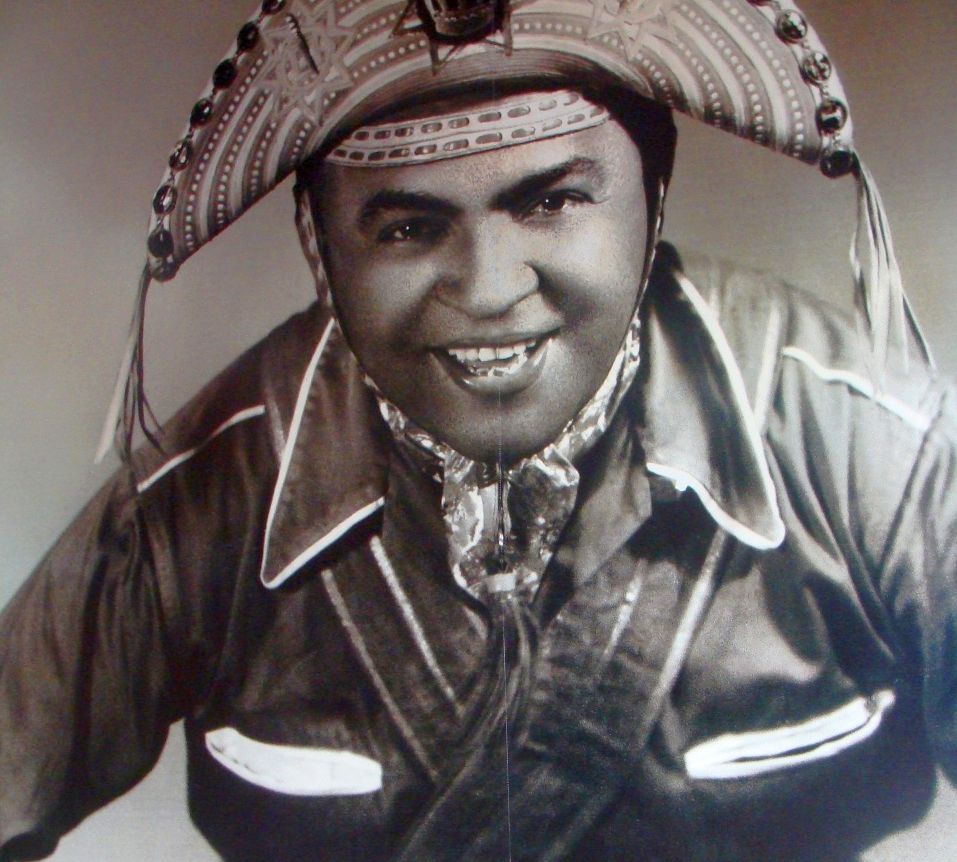
Among observations, ideas, opinion that have come my way these past weeks:
A universal concern about the land question. From Ambassador Vladimir Murtinho to opposition politician Lima Filho, to student film-maker Ivan Cordeiro, all express opinion that unfair distribution of land is major problem facing the country.
A surprisingly free expression on political issues. I find extensive discussion of politics across broadest spectrum from Communist to right-wing militarist/authoritarianism something akin to excessive political discussion in S.A. Symptomatic of a politically troubled, divisive land?
Among younger people especially, an awakening awareness of a special Brazilian cultural heritage. Particular emphasis on Indian culture and folklore. [NOTE (to myself): These observations relate to the North-East/Bahia and my be considerably different in the South.)
A dramatic degree of poverty, disparity between rich and poor here in the North-East with apparent absence of middle-class.
A growing racial problem not as clearly defined as British or U.S. , probably more a race/economics problem. Curious to hear, for example, talk of a Brazilian Black Power movement, from Roberto Mattos' friend, Silvio.
Yet, despite the problems, a special pride in Brazil (though not universal, a number of young people talk of U.S.A. as ultimate place.)
August 7 Missed yesterday's entry: up at 6.30 to travel to Pumaty sugar mill and refinery, back 8 p.m. preparing for interview with Gonçalves de Mello till 10.30 leaving little time for notes.
This morning spent at Baptist seminary examining journals of last century Baptist missionaries. Taylor, one of earliest Baptist missionaries, actually notes occurrence of Canudos with somewhat confused interpretations. But more important was Baptist reports of the degree of intolerance present prior to the coming of the Republic and separation of State/Church. Repeated reports of attacks on missionaries, of anti-Protestant moves inspired by local priests, of Bible burnings etc.
The Baptists get vitriolic in their condemnation of the RC church as idolatrous, pagan etc. with numerous references by Taylor to idol worship in form of saints etc. Today the Baptists have 500,000 followers, as against 90 percent of 120 million Catholic, which shows the progress...
Day 31 of the trip. How far from that evening so long, long ago when I left Sintra and family at the station.
My confidence continues to soar. Today's interview with João Gonçalves de Mello, Recife's foremost historian, was typical. Impressed by my knowledge of Brazilian history. Ran basic outline of my story against him and 90 percent stood up without critique!
Realize that aside from the setting, atmosphere I am getting on the trip and basic groundwork already complete, when I get back I am going to have to read my way into the fine details of every traveler, every translation I can lay my hands on. This can be an ongoing process as the book develops, so that I'll have the background pretty well locked up. And then comes the “imagination!”
Almost complete in Recife but for Gilberto Freyre.
Note: TV reporting Bolivia's 195th coup!
August 11 On bus again! Left Recife last night for 33-hour trip to Belém. Longest haul to date made longer by one hour roadside delay. We've run of gas — eventually bought from a passing truck.
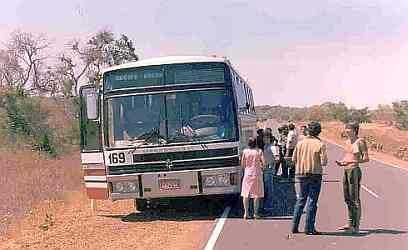
Missed August 8-10 entries. Stayed to await interview with Gilberto Freyre. I was able to bounce most of my ideas off him and with no exception, they were sound. Pleased that some of the more controversial leads I suggest did not put Freyre off — “No evidence of that but not totally unlikely.”
For example, my suggestion that there could be a link between Pernambucanos (Cardosos) and Inconfidência Mineira (Da Silvas). Look to a Masonic link, Freyre suggests. And, for example, the suggestion that there were black slaves present from the beginning, brought from Portugal. He likes the idea though, of course, stressed early importance of the Indians, especially the women.
At 82, Freyre is a sprightly man, quick-witted, especially against the onslaught of ELU. I see no reason (as some do) of revising his theories, update yes, but if Pumaty is any example, the Case Grande idea holds up today as ever. What criticism I did hear from Freyre was either irrelevant or only related to small issues. [Note: This journal is, of course, separate from my interview notebooks that go into far more detail about my meeting with Professor Freyre and others. In many instances, too, major sources like Freyre were given a copy of my Outline for Brazil in advance and had a good idea of my thinking.]
Keeping this journal is a habit I am beginning to see as indispensable. The images and experiences are so different, so much a shock of the new or the familiar refound — that without recording them it would be impossible to remember all. In Brazil, each new day is one of discovery!
On Saturday night, a 9.30 visit with Amalia and her vast family, ten brothers and sisters, all older, twenty-eight nephews etc. Afterwards to a music bar and home by 4.30 a.m. Looked to quiet Sunday and started out at Boa Viagem beach, then to Olinda but on way back to hotel bumped into my friend Black Jimi and got home 2.30 a.m. Afternoon interview with Freyre and on bus at 6.15 p.m.
Amalia's family represent the ultimate extended family and, with experience of Antonietta in mind, typical of the grand old families of Brazil. Something I need to create for the Cardosos (Cavalcantis) of 1960/1970. Amalia's family is not only a patriarchal but a political unit with connections at every level, federal, state, local. Her references to various members invariably brings up one or another coronel- type connection.
Won't forget entering house and meeting family, seemed to be dozens of them, including Lima Filho. It would've been impossible to remember all their names. Event was the birthday of one of the twenty-eight nephews and nieces. Head of the family is mother, 82, and Amalia at 37 is the youngest child. Amalia's father was a prominent opposition member and owner of five farms, plus Lord knows what more. — All gathered round on patio after dinner for sing song accompanied by an excellent guitarist.
What some had to say was often directly out of a RSA situation: members of a privileged class and their involvement that would fit perfectly into a Progressive Party mold. Some liked to distance themselves from the diamond-bedecked Dona of Pumaty but were really speaking the same language. Too much pobre (poverty) agreed, but as I've seen so many times in Brazil, such social consciousness is voiced in one breath and in the next, they go on to tell you about a) the beach apartment b) the beach house c) the farm in the sertão, replete with many jokes about the people there, not racialist though in similar vein.
As I told Gilberto Freyre, one of these days someone should do a comparative study between South Africa and Brazil. Could be illuminating.
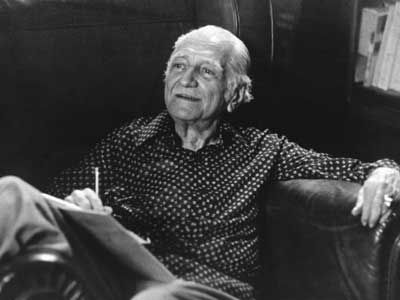
And then there was Black Jimi. (I met Jimi Carvalho weeks earlier when he tried to sell me a sixty cruzeiro religious print, asked him to sit down for a beer, and gained a firm friend. Jimi took me around the other Recife, places like Brasília Teimosa. He claimed to be a son of Carvalho, a famous Rio gangster and had been a street child.) When I bumped into him on Sunday, Jimi was sitting on the pavement with two girls in the midst of an artisan fair. One girl was about twenty, an artist, the other a poet who looked about thirteen or fourteen. Rosa and Sandra, the poet, left soon afterwards saying they regretted not getting to know me but had to go “because of circumstances beyond their control.” When Jimi came to say goodbye to me at the Rodoviária (bus station), he brought a farewell poem from my young admirer!
My travels with Jimi underlined the poverty (and racism) in the city. (Until I insisted, my hotel wanted to bar Jimi from entry.) Aside from Jimi's jaunty black beret and “Black Power” tattooed on his arm, it's obvious that his racial humiliation is very real.
If he comprehends the meaning of my white SA background, it must be strange for him to contemplate my attitude as compared with average branco here (or, of course, in SA.) Not just my gift of an old pair of Americano jeans and 1000 cruzeiros to buy a radio — Was amused to see radio proudly displayed to me at Rodoviária! What's to become of Jimi and tens of thousands like him, not only black but brown, and dispossessed? I think that Vladimir and others in referring to “land problem” being most serious etc. is catch-all phrase for many more and diverse social ills. Like the land, the dimension of the problem is staggering.
As everyone, though not Jimi's people, says, Recife is different to Salvador. The povo (= people, but with meaning more akin to masses.) in Recife are fechado, I'm told, closed, meaning they don't show their emotions easily. When writing about Salvador earlier, I spoke of the absence of poverty of spirit; that though there was poverty, it was not grinding, resentful.
Here, besides the obvious abandonados, some with childish innocence that hides so much and shows the Salvador spirit, evidence of a “poor and dangerous society” is everywhere, with massive unemployment, the under-employment with people earning an existence by selling envelopes, sixty cruzeiros posters, oranges, single cigarettes (an estrangeiro averages at least half a packet of cigarettes bummed a day), Jimi and his two cruzeiros, all he had in the world.
Add to these images an overbearing military presence: "military" everywhere, soldiers, also traffic police, ambulance, fire, all possessing a definite military look. I found Recife an oppressive, unhappy town, a feeling not alleviated by my pleasant encounters with the upper tenth. Of course, I have to remember I am looking at the end result, not Recife through the ages, but there is something to understand here.